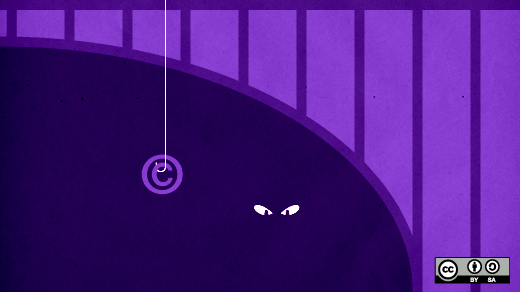Modern copyright law grants copyright automatically to any creative work, including simple things like blog posts – and small pieces of code on github. This default copyright creates an assumption that for someone to do anything further with someone else's creative work requires permission from the author—what Lawrence Lessig calls "the permission culture." The open license ecosystem often takes this permission culture for granted, rather than fighting back—and that may be contributing to the proliferation of unlicensed code.
Post open source software
A few months back, James Governor (@monkchips) tweeted: "younger devs today are about POSS–Post open source software. f*ck the license and governance, just commit to github." While the actual extent of "POSS" is debatable, there is definitely an increase in the amount of unlicensed code out there. A recent post by Max Jones Werner, Are GitHubbers taking open source seriously?, suggests that 20% or more of the most-watched github projects are unlicensed. (The previously dominant code sharing platforms, SourceForge and Google Code, required a license choice before publication, so their percentage was zero.) The pushback against licensing isn’t specific to software, either—at least some sharing musicians are deliberately spurning Creative Commons and Nina Paley has been obliquely making the same point about the licensing of her art as well.
This lack of licensing is a bad thing—it creates confusion for other developers, creates risk for authors, and is great for lawyers. So if all that is true—why are people still not doing it?
Reasons for the licensing pushback
POSS might be more than just bad hygiene. It is easy to assume that the pushback against licenses ("post-open source") is because licensing is confusing/time-consuming and people are lazy/busy. While I’m sure these are the primary reasons, I think that, for some people, the pushback against licenses often reflects a belief that "no copyright should mean no permission needed." In other words, those people choose not to use a license because, on some level, they reject the permission culture. In this case, publishing without a license is in some way a political statement—"not every use should need permission."
Another motive, that I won’t go into here but which also deserves serious discussion for license authors, is simply that the values encapsulated in our licenses are taken for granted by younger developers who have always had a plentiful, healthy free-as-in-beer code commons. Both the permissive and copyleft communities would do well to argue the case for their licenses (not just their overall philosophies) better than they currently do.
Rejecting the permission culture
If some "no license" sharing is a quiet rejection of the permission culture, the lawyer’s solution (make everyone use a license, for their own good!) can be interpreted as active acceptance of the permission culture. Once an author uses a standard license, their immediate interests are protected—but the political content of not choosing a license is lost. Or to put it another way: if license authors get their wish and everyone uses a license for all content, then, to the casual observer, it looks like everyone accepts the permission culture. This could make it harder to change that culture—to change the defaults—in the long run.
To be clear, a license can't actually change the defaults—those are baked into copyright law. The best it can do is register a protest against, and raise awareness of, the current state of things.
So how might we preserve the content of the political speech against the permission culture, while also allowing for use in that same, actually-existing permission culture? Or to put it more concisely: what would a "license" that actively rejects the permission culture look like?
A couple of off-the-wall options:
- Permissive + political preamble license: The WTFPL license ("Do WTF you want") has been floating around for ages, and using it makes the point that (1) you want people to use your code and (2) you’re irritated that they even have to ask. Adding a brief "I hate that I have to do this" preamble to a permissive license like CC-0 might serve a similar purpose, while providing more legal certainty than WTFPL. (And of course such a preamble could also be used with a strong copyleft, like copyleft-next.)
- Fair Use: Fair use is the traditional safety valve for copyright, but it is hard to know if a particular use is "fair." So a license could be written that it, instead of formally licensing under specific terms, instead aims to provide more certainty about fair use. Some ways this could be done would include broadly defining the fair use categories, explicitly accepting transformative use as a factor in the fair use analysis, or asking courts to interpret ambiguity in favor of the recipient instead of the author. It is also possible to imagine this as a supplement to the existing fair use clauses in modern licenses (CC-BY 3.0 Sec. 2, GPL v3 Sec. 2, MPL 2 Sec 2.6), laying out a strong vision of fair use to help guide and protect anyone relying on those clauses.
- "What People Actually Think Copyright Is" license: most Americans think that personal use of copyrighted materials is legal under modern copyright law. (See research mentioned in Jessica Litman's Digital Copyright.) So a license that focused on personal use might work better than the more nebulous "non-commercial." As a bonus, since commercial interests will clearly be unable to use the content, getting it "right for lawyers" may be less of a concern.
Careful readers will note that the last two options are unlikely to be OSI-open or FSF-free. For the purposes of this exercise, that’s OK—the assumption that licensing is always a good thing is what I’d like to provoke people to think about here.
A provocation
I don’t offer these license ideas as a comprehensive survey of what an anti-permission-culture license might look like, or even a good survey. Instead, take them as a provocation: are we— articularly authors and evaluators of open licenses—part of the problem of the permission culture? Are we actually responding to the people who use our licenses, if one of their desires is to push back against the need to license? Can we be more creative about expressing distaste for the permission culture, without gumming up the works of sharing too much? I think that, if we think critically, we can, and perhaps we should.







10 Comments